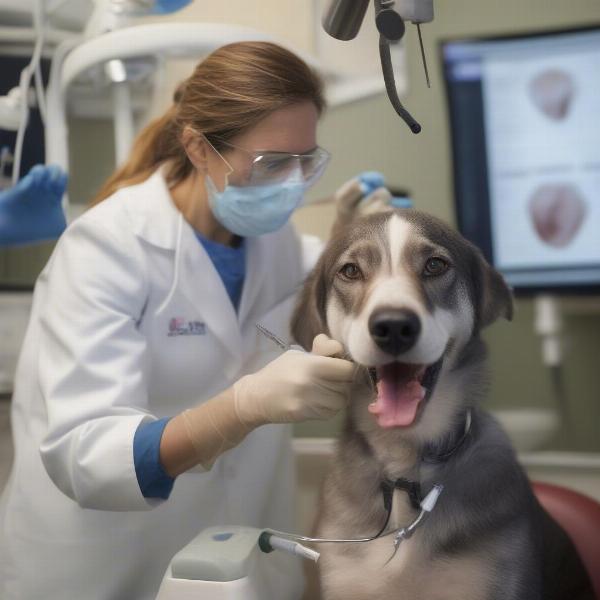Keeping your dog’s teeth clean is crucial for their overall health and well-being. But how often do you really need to get your dog’s teeth professionally cleaned? This is a common question among dog owners, and the answer isn’t always a simple one-size-fits-all. This article will delve into the factors that influence dental cleaning frequency, provide practical tips for at-home dental care, and help you determine the best approach for your furry friend.
Factors Influencing Dental Cleaning Frequency
Several factors play a role in determining how often your dog needs professional teeth cleaning. Breed, age, diet, and overall oral hygiene habits all contribute. Smaller breeds, such as Chihuahuas and Yorkies, are often more prone to dental issues and may require more frequent cleanings. Older dogs, regardless of breed, are also at a higher risk of developing dental disease. Diet also plays a significant role. Dry kibble can help scrape away plaque, while soft foods tend to stick to teeth, promoting tartar buildup. Finally, regular at-home dental care, such as brushing and dental chews, can significantly impact the frequency of professional cleanings.
 Professional Dog Teeth Cleaning at the Vet
Professional Dog Teeth Cleaning at the Vet
At-Home Dental Care: A Key to Healthy Teeth
Regular at-home dental care is the cornerstone of preventing dental disease and reducing the need for frequent professional cleanings. Brushing your dog’s teeth daily with a dog-specific toothpaste is ideal. Start slowly, introducing the toothbrush and toothpaste gradually. Positive reinforcement, such as treats and praise, can make the process more enjoyable for both of you.
How Often Should Dogs Get Their Teeth Cleaned Professionally?
While daily brushing is essential, professional cleanings are still necessary. Most veterinarians recommend a professional cleaning once a year. However, some dogs may require cleanings more frequently, especially if they have pre-existing dental conditions or are prone to tartar buildup. Your veterinarian can assess your dog’s individual needs and recommend the optimal cleaning schedule.
Signs Your Dog Needs a Dental Cleaning
Even with diligent at-home care, it’s important to watch for signs that your dog might need a professional cleaning. Bad breath is often the first noticeable indicator. Other signs include red or swollen gums, excessive drooling, difficulty chewing, or loose teeth. If you notice any of these symptoms, schedule a check-up with your veterinarian.
Conclusion
Maintaining your dog’s oral health is a vital part of responsible pet ownership. By understanding the factors that influence dental cleaning frequency and implementing a consistent at-home dental care routine, you can help your dog enjoy a healthy, happy smile for years to come. Don’t hesitate to consult with your veterinarian to determine the best dental care plan for your furry companion. Remember, regular professional cleanings, combined with daily brushing and a healthy diet, are essential for optimal oral health.
FAQ
- How much does it cost to get a dog’s teeth cleaned? The cost varies depending on your location and the complexity of the procedure, but it typically ranges from $200 to $500.
- Is anesthesia required for dog teeth cleaning? Yes, general anesthesia is necessary for thorough cleaning and to ensure your dog’s comfort and safety.
- Can I clean my dog’s teeth myself? While daily brushing is encouraged, professional cleanings are still necessary to remove tartar below the gum line.
- What are the risks of not cleaning my dog’s teeth? Dental disease can lead to pain, tooth loss, and even more serious health problems affecting the heart, kidneys, and liver.
- What are the best dental chews for dogs? Look for Veterinary Oral Health Council (VOHC) approved chews, which have been proven to be effective in reducing plaque and tartar.
- How can I get my dog used to teeth brushing? Start slowly and use positive reinforcement, such as treats and praise. Gradually introduce the toothbrush and toothpaste.
- Are there any home remedies for dog bad breath? While some home remedies can temporarily mask bad breath, addressing the underlying cause, often dental disease, is crucial.
Related Articles on ILM Dog
- how often to get dogs teeth cleaned
- how often should dogs get their teeth cleaned
- moulting brush for dogs
About ILM Dog
ILM Dog (https://ilmdog.com) is your go-to resource for expert advice on all aspects of dog care, from breed selection and health to training, nutrition, and grooming. We offer practical tips and valuable insights to help you provide the best possible care for your furry friend. Our expertise covers a wide range of topics, including choosing the right breed, maintaining optimal health, establishing effective training techniques, providing proper nutrition, and ensuring appropriate grooming practices. Whether you’re a new dog owner or a seasoned pro, ILM Dog is here to support you every step of the way. For personalized advice or inquiries, contact us at [email protected] or +44 20-3965-8624.